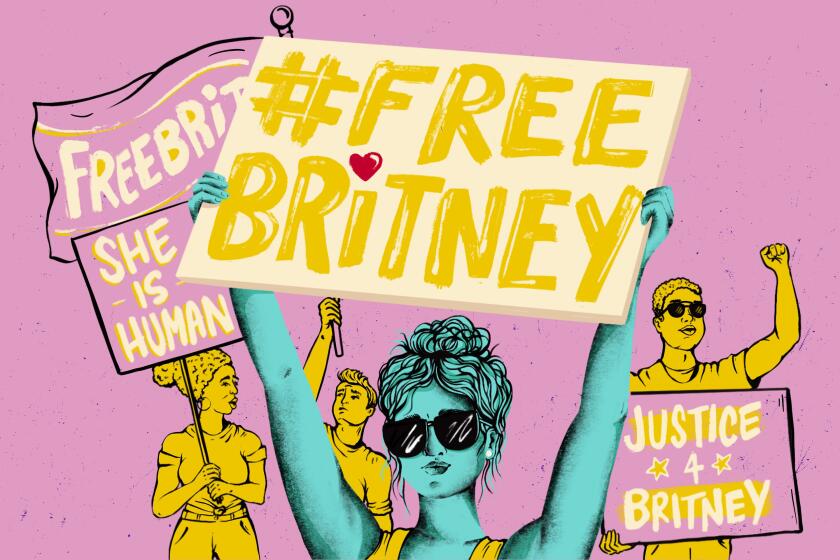On Kacey Musgraves’ divorce album, a pop star-in-waiting seeks wellness more than revenge
- Share via
Kacey Musgraves’ wedding video is still online.
Posted (at least for the moment) in the digital portfolio of the woman who shot it, the six-minute mini-movie set to the Weepies’ “Gotta Have You” lovingly depicts Musgraves’ 2017 nuptials in all their artisanal farmhouse glory: Here’s the acclaimed country singer in her white gown as she nuzzles a horse festooned with flowers; here’s her husband-to-be, fellow musician Ruston Kelly, pecking out his vows on a vintage typewriter.
It’s all very sweet and festive, though now — barely a year after Musgraves ended the marriage that inspired her Grammy-winning 2018 album, “Golden Hour” — the video is laced with the phantom sorrow of what’s to come.
Country music history is full of juicy divorce records: Willie Nelson’s “Phases and Stages,” Tammy Wynette’s “D-I-V-O-R-C-E,” Miranda Lambert’s “The Weight of These Wings.” But Musgraves’ frustrating new LP, “Star-Crossed,” catches the 33-year-old at a transitional point — less a plain-talking country act than a slippery pop star in waiting. So “Star-Crossed,” which tracks the dissolution of her and Kelly’s relationship, invites a different type of scrutiny; it’s the kind of album a self-renewing artist makes to pull focus from the evidence of who she used to be.

“There is a light inside of me,” she sings near the end of the record, which is organized into three acts: falling in love, falling out of it, moving on. “There was a shadow of a doubt / But, baby, it’s never going out.”
Musgraves, who grew up in small-town Texas, has been voicing her doubts about tradition — and about the prescribed roles women are expected to fill in life and in art — since she broke out of Nashville nearly a decade ago. With its mellow disco grooves and its lightly psychedelic textures, though, the gorgeous and moving “Golden Hour” effectively reframed Musgraves’ career; soon she was playing Coachella, touring with Harry Styles, cutting duets with Lana Del Rey and Troye Sivan.
What started as a blogger’s tagline has become a global rallying cry for justice and freedom. The story of #FreeBritney, as told by the movement’s leaders.
She extends that sonic experimentation on the tender, trippy “Star-Crossed,” for which she re-teamed with her “Golden Hour” producers, Ian Fitchuk and Daniel Tashian, and which arrives as a joint release from MCA Nashville and Interscope. The songs blend acoustic guitars and glassy synths; “Breadwinner” has a late-’90s TLC/Destiny’s Child beat, while “There Is a Light” climaxes with a jazzy flute solo.
And she’s clearly following a pop playbook in terms of rollout, with an accompanying short film (à la Beyoncé’s “Lemonade”) and a performance scheduled for Sunday’s MTV Video Music Awards. On social media, Musgraves is leaning into the idea that her breakup album is perfect for crying your eyes out — a millennial’s version, let’s say, of Olivia Rodrigo’s cathartic Gen Z melodrama.
Yet “Star-Crossed” is actually a less emotional experience than the blissed-out “Golden Hour,” which practically vibrated with feeling.

Perhaps that’s because, in another break from the country norm, her marriage died quietly rather than with anybody drunkenly riding a lawnmower into town. In interviews the singer has suggested that she and Kelly simply drifted apart — that their “season changed,” as she told Rolling Stone. And sometimes she catches that small-scale heartbreak, as on “Camera Roll,” about resisting the urge to scroll through the photos she can’t bring herself to delete, and the exquisite “Hookup Scene,” in which she describes how hard it is to replace an intimate connection.
The latter might be the most stripped-down number on an album full of colorful production touches — all the better to savor Musgraves’ curiously affectless singing voice, which, with the right lyric, can take on an almost philosophical bent. (“Breadwinner” is the one track where she gets heated as she counsels a friend to stay away from a guy who “wants your shimmer to make him feel bigger.”)
Drake’s sixth album, coming on the heels of rival Kanye West’s haphazard ‘Donda,’ feels deeply aware of its excesses, contradictions and charms.
More often than not, though, Musgraves’ writing on “Star-Crossed” is squishier and more prone to cliché than on “Golden Hour” or her earlier albums; she fears she’s “going off the deep end” on “Simple Times” and recounts her trip “to hell and back” on “What Doesn’t Kill Me.” On “If This Was a Movie” she sings about all the ways in which art fails to capture the complexity of real life — but maybe that’s a point she’s already made with songs about a light at the end of the tunnel and a daddy telling his daughter to keep her feet on the ground.
You can hear these soft landing spots as part of the interest in wellness culture the singer has been talking about lately; certainly, only a churl would begrudge her whatever comfortable space she needs to heal from her divorce. Or maybe it just turns out Musgraves is the rare songwriter more effective in happy mode than sad — the clearest sign yet that she’s left country music behind.
More to Read
The biggest entertainment stories
Get our big stories about Hollywood, film, television, music, arts, culture and more right in your inbox as soon as they publish.
You may occasionally receive promotional content from the Los Angeles Times.











